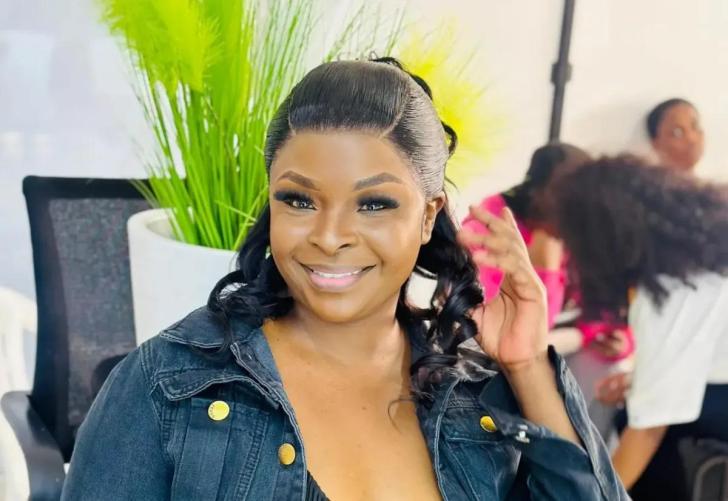News / National
X-rated confession: What were Mai Jeremaya and DJ Ollah 7 thinking?
10 Jul 2025 at 08:07hrs |
0 Views

There has been widespread outrage across social media, on the streets of Harare, and various public forums following an X-rated podcast episode aired on Tuesday featuring DJ Ollah 7 and Mai Jeremaya. The show, which contained explicit content, notably lacked any age restrictions, sparking intense criticism and concern.
During the nearly three-hour interview, Mai Jeremaya revisited rape allegations against two men, Thabo Blessing Dube and Martin Charlie, claims which were previously dismissed by a Harare magistrate. The court ruled that Mai Jeremaya was a willing participant in a sex-for-money scheme, a finding that has not stopped her from publicly repeating the accusations on the podcast.
The interview drew sharp criticism not only for its graphic content but also for DJ Ollah 7's handling of the discussion. Many observers accused him of poor journalistic ethics, highlighting how his probing questions pushed Mai Jeremaya into sharing deeply personal and disturbing details. Critics pointed out that his approach showed a lack of sensitivity towards trauma survivors and disregard for judicial rulings.
Among the controversial questions Ollah 7 posed were inquiries into Mai Jeremaya's first sexual encounter, the nature of her relationships, and even whether her husband, JMP, continued to have sexual relations with her after the alleged incidents. The explicit nature of these questions, especially concerning intimate details, has been deemed inappropriate and harmful by many commentators.
The interview also saw Mai Jeremaya admitting to past dishonesty, infidelity, and accepting money from various men despite being married. She acknowledged a lifelong pattern of compulsive lying, which she said was noticed by a pastor during her youth, who advised her to repent.
This candidness has led to further debate about her credibility, with some questioning whether she might be suffering from a compulsive lying disorder. Meanwhile, the two men she accused remain legally cleared by the magistrate's ruling, although the case is subject to an automatic review by the High Court, which will consider only the court records and not social media or media commentary.
Legal experts and media watchdogs have expressed concern that the podcast episode undermines media laws and ethical journalism standards, particularly those concerning trauma-informed reporting on sexual violence. They urge media outlets to respect survivors' mental health and judicial processes, emphasizing the importance of balanced, sensitive, and responsible reporting that protects victims while upholding legal fairness.
The public reaction to the podcast has been mixed, with some criticizing DJ Ollah 7 for insensitivity and poor conduct, while others fault Mai Jeremaya for participating in such an explicit and public airing of private matters. Questions also linger about the potential impact of her revelations on her marriage and personal life.
As the debate continues, the episode serves as a stark reminder of the challenges faced when covering sensitive topics like sexual violence, and the critical role that ethical journalism plays in protecting survivors and maintaining respect for the legal system.
During the nearly three-hour interview, Mai Jeremaya revisited rape allegations against two men, Thabo Blessing Dube and Martin Charlie, claims which were previously dismissed by a Harare magistrate. The court ruled that Mai Jeremaya was a willing participant in a sex-for-money scheme, a finding that has not stopped her from publicly repeating the accusations on the podcast.
The interview drew sharp criticism not only for its graphic content but also for DJ Ollah 7's handling of the discussion. Many observers accused him of poor journalistic ethics, highlighting how his probing questions pushed Mai Jeremaya into sharing deeply personal and disturbing details. Critics pointed out that his approach showed a lack of sensitivity towards trauma survivors and disregard for judicial rulings.
Among the controversial questions Ollah 7 posed were inquiries into Mai Jeremaya's first sexual encounter, the nature of her relationships, and even whether her husband, JMP, continued to have sexual relations with her after the alleged incidents. The explicit nature of these questions, especially concerning intimate details, has been deemed inappropriate and harmful by many commentators.
The interview also saw Mai Jeremaya admitting to past dishonesty, infidelity, and accepting money from various men despite being married. She acknowledged a lifelong pattern of compulsive lying, which she said was noticed by a pastor during her youth, who advised her to repent.
This candidness has led to further debate about her credibility, with some questioning whether she might be suffering from a compulsive lying disorder. Meanwhile, the two men she accused remain legally cleared by the magistrate's ruling, although the case is subject to an automatic review by the High Court, which will consider only the court records and not social media or media commentary.
Legal experts and media watchdogs have expressed concern that the podcast episode undermines media laws and ethical journalism standards, particularly those concerning trauma-informed reporting on sexual violence. They urge media outlets to respect survivors' mental health and judicial processes, emphasizing the importance of balanced, sensitive, and responsible reporting that protects victims while upholding legal fairness.
The public reaction to the podcast has been mixed, with some criticizing DJ Ollah 7 for insensitivity and poor conduct, while others fault Mai Jeremaya for participating in such an explicit and public airing of private matters. Questions also linger about the potential impact of her revelations on her marriage and personal life.
As the debate continues, the episode serves as a stark reminder of the challenges faced when covering sensitive topics like sexual violence, and the critical role that ethical journalism plays in protecting survivors and maintaining respect for the legal system.
Source - H-Metro
Join the discussion
Loading comments…
































